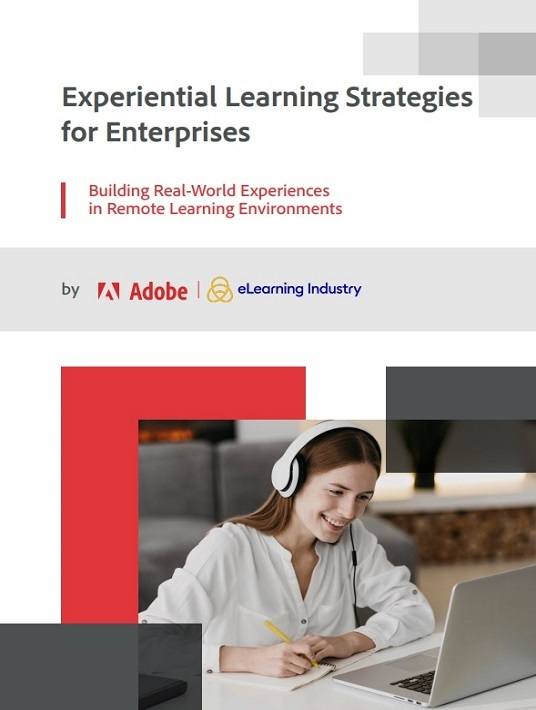Are Specialized Experiential Learning Platforms Worth The Investment?
In this article, we talk about the 4 benefits experiential learning platforms can offer your remote employees, as well as the importance of supporting this venture with specialized experiential training software.

eBook Release
Experiential Learning Strategies For Enterprises: Building Real-World Experiences In Remote Learning Environments
Discover how to execute experiential learning strategies for enterprises that enrich the experience and facilitate knowledge sharing.
4 Benefits Of Using Experiential Learning For A Remote Workforce
1. Increased Engagement And Motivation
Because it creates interactive and fun learning experiences, Experiential Learning is highly engaging to learners. Besides, it is not hard to understand why training activity that allows hands-on interaction, reflection, and collaboration between learners is more interesting than passively listening to an instructor and taking notes. Specifically, learning platforms enable users to access interactive content, such as games, quizzes, simulations, etc. As a result, learners are motivated to participate actively in the learning process, thus increasing levels of skill development.
2. Promotes Teamwork
Experiential Learning thrives in collaborative environments. As learners express their reflections and concepts regarding the training experience, they are able to come up with creative solutions to whatever problem they’re tackling. Plus, distance poses no issue at all! With dedicated chats, forums, and breakout rooms, employees can communicate and work together as if they are in the same room. Through collective reflection, they build confidence in their critical thinking and problem-solving skills and become less dependent on instructors or supervisors to find solutions to their problems.
3. Real-World Practice
The main benefit of Experiential Learning is, without a doubt, the ability to directly apply theory to practice. Connecting the Experiential Training experience to on-the-job situations allows learners to retain information better. In addition, they are given the opportunity to practice in an environment that leaves room for mistakes. For example, they can hone their communication skills with challenging customer personas via a simulator that eliminates the risk of a bad customer review. Practicing in a stress-free environment gives your employees room to grow by focusing on developing behaviors that will prove useful after the end of the training.
4. Promotes Lifelong Learning
Experiential Learning is so much more than a traditional training course. It does not just give learners the answer; it teaches them how to discover it. By actively involving learners in the training experience and encouraging them to analyze and reflect on it, Experiential Training courses help them improve their critical thinking, as well as problem-solving, communication, and knowledge management skills. These are the 21st-century skills they need to grow personally and professionally and bring value to your organization.
3 Ways To Determine If Advanced Experiential Learning Platforms Are Worth The Investment
An Experiential Learning platform gives you the opportunity to create, launch, and manage Experiential Learning programs that take online training to the next level. But the question remains: can simple video conferencing platforms do the trick, or do you need a specialized Experiential Learning platform?
Instructor-Learner Communication
It is important to touch on the element of interaction, whether we are talking about an educational or professional virtual environment. A simple video conferencing platform gives you the opportunity to reach out to learners, but only in one way. An advanced Experiential Learning platform allows you to truly engage learners with chats, drawings, quizzes, and polls, all the while giving you data about learner engagement levels. On the other side of the screen, learners can easily keep up with the help of asynchronous browsing, as well as have their questions answered in dedicated chats without having to interrupt the flow of the session.
Control Over Your Training Session
Think back on your last online training session via video conferencing software. You probably had to log in and start preparing your material on the spot with minimal room for creativity. Now imagine accessing a window that gives you countless virtual experience design possibilities. One that you can prepare beforehand and edit and add to in the background without affecting what trainees are seeing. If the second option sounds more enticing, then a specialized Experiential Learning platform is the way to go.
Standardization
Ensuring that the quality of training remains the same across different departments is extremely important. But that is hard to achieve when the software you are using makes you start over every single time. Thankfully, this is not the case with advanced platforms. In fact, they allow you to save each session that you design as a template, allowing you to use it as many times as you need. In addition, you can perform small or major edits on each template, thus creating a training style across sessions.
Conclusion
The benefits of Experiential Learning in remote environments are truly more than one can explain in a chapter. But one thing we can say is that you are going to need support from specialized software if you’re going to make the most of it. Hopefully, this section has convinced you that specialized Experiential Learning platforms are a foolproof way to offer your learners high-quality training that will boost ROI and add value to your organization.
Download the eBook Experiential Learning Strategies For Enterprises: Building Real-World Experiences In Remote Learning Environments today to launch programs that leave a lasting impression and maximize ROI.
